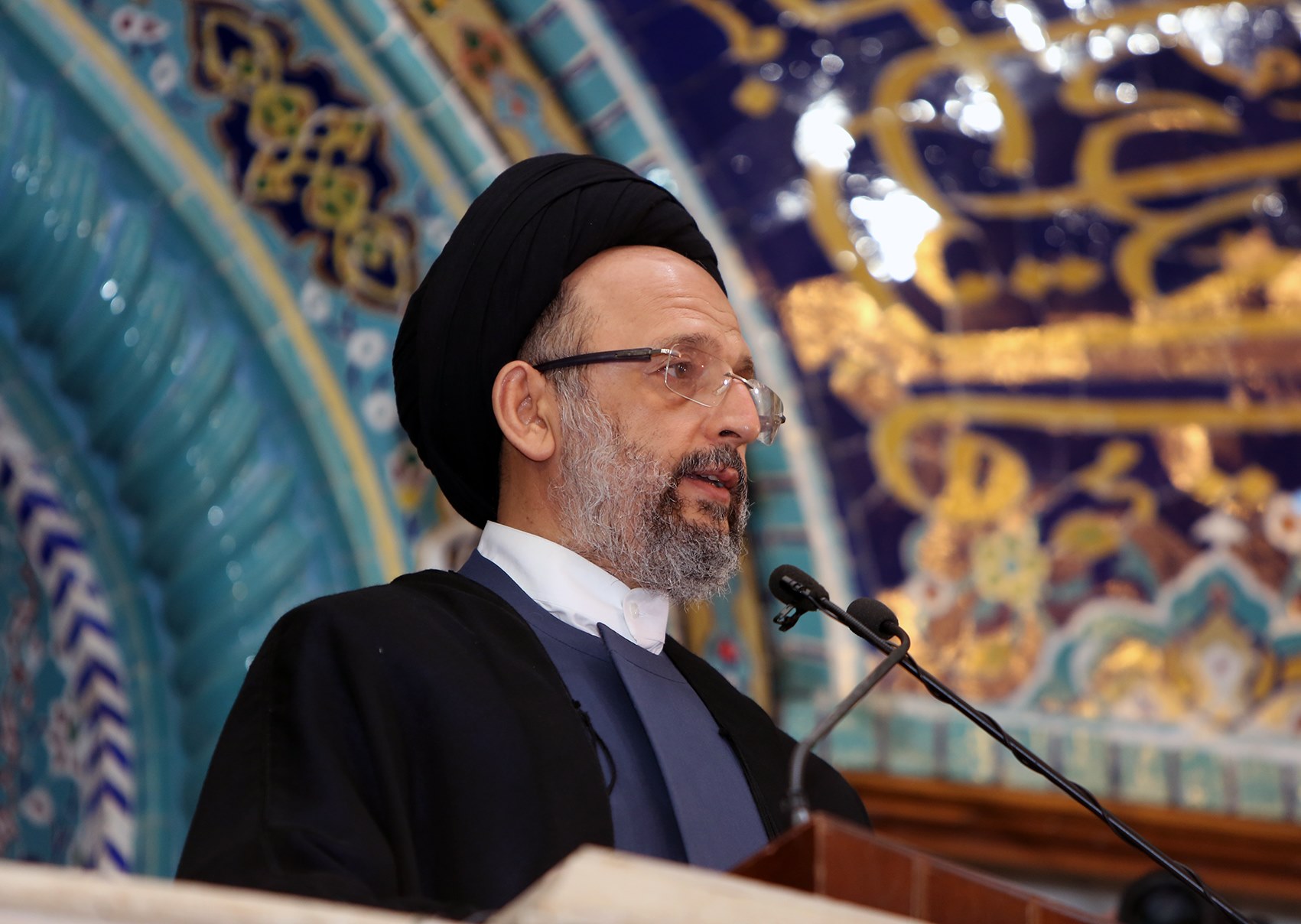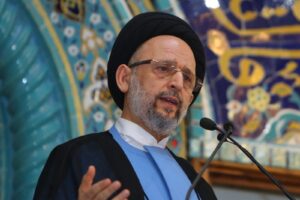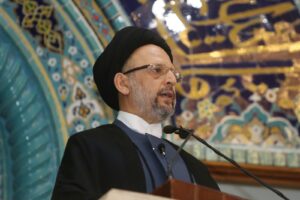If poverty were a man I would have killed him
The first Sermon
Allah, The Most Exalted, says in His Glorious Book: Satan threatens you with poverty and orders you to immorality, while Allah promises you forgiveness from Him and bounty. And Allah is all-Encompassing and Knowing. Allah, the Most Exalted, speaks the truth. The most dangerous thing than can afflict societies and nations happens when people do not find their needs of food, health care, education, job opportunities and infrastructure… The lack of these essential needs will make nations lose their strength, presence and security. It paves the way for violating man’s dignity and enslaving him, as well as paving the way to the spread of corruption, deviation and hatred.
The Honorable Hadiths have pointed out to the dangerousness of the spread of poverty. The Messenger said: poverty is almost disbelief. He also said: O God, I take refuge in You against disbelief and poverty. Imam Ali saw that dealing with poverty should be the same as dealing with criminals. He said: If poverty were a man I would have killed him . The honorable companion, Abu Zar, has justified for a poor person to declare war against those who are responsible for poverty or those who helped them: ‘I wonder why those who don’t find something to eat don’t go out holding their swords ready to fight?’
Therefore, since poverty is the [biggest] problem in life, Islam worked on reducing its dangers through its rulings
and laws on several levels:
The first: to awaken the feelings of the rich towards the poor so as they will feel their sufferings, as there is nothing stronger than the feeling of the hungry and those who suffer in life in acting as a motive to help the poor and the needy. And this what Imam As-Sadiq(a.s.) clearly stated: Allah enjoined Fasting so that the rich and the poor may be equal. The rich never experience hunger that they may show mercy to the poor The rich provide everything for themselves because of their wealth. Allah desired that His servants may be equal on this occasion and the rich may also feel hunger and suffer pain. He, therefore, enjoined fasting that the rich may be kind to the destitute and merciful to the hungry.
The second: Allah, The Most Exalted, called all who have some money that exceeds their needs to give some of it to help the poor. He considered it a religious duty through both Khums and Zakat. This is what Allah, The Most Exalted, indicated, when He said: And from their properties was [given] the right of the [needy] petitioner and the deprived. TheHadith too stressed on the same point:
Imam Ali (a.s.) said, ‘Verily Allah, allotted the food provisions of the poor within the wealth of the rich, so no poor man goes hungry except as a result of what a rich man has denied him, and Allah, most High, will question him about that.’ And: Verily Allah allotted to the rich their wealth in proportion to what would also suffice the poor from among them, so if they go hungry or are naked or exhausted, it is only because of the rich people’s deprivation of them. And Allah has a right to take them to account for it on the Day of Resurrection and to punish them for it.’
In addition to performing their financial duties, Allah has urged believers to give in charity. He said: Take alms out of their riches and thereby cleanse them and bring about their growth (in righteousness), and pray for them. Indeed your prayer is a source of tranquility for them.” Allah is All-Hearing, All-Knowing.
The Hadith says that charity extinguishes Lord’s anger and keeps away from Hell-fire…And that it falls in the hand of Allāh before the hand of the poor.Allah, The Most Exalted, says:Do they not know that it is Allah who accepts repentance from His servants and receives charities and that it is Allah who is the Accepting of repentance, the Merciful? Charity is also a means to ward off calamities and increasing one’s age and wealth.
The third: The government should shoulder its responsibility, for its role is to secure the needs of the poor and support them. If it does not, it should be held accountable. And this is what The Commander of the Faithful commanded Malik Al-Ashtar when he appointed him as ruler of Egypt: (Fear) Allah and keep Him in view with regard to the lower class which consists of those who have few means: the poor, the destitute, the penniless and the disabled because in this class are both the discontented and those who beg. Take care for the sake of Allah of His obligations towards them for which He has made you responsible. Fix for them a share from the public funds and a share from the crops of lands taken over as booty for Islam in every area because in it the remote ones have the same shares as the near ones. All these people are those whose rights have been placed in your charge. Therefore, a luxurious life should not keep you away from them.
In addition, the Imam took a decisive stand against all who plundered public money…
Dear loved ones; it is natural that there should be disparities in the society, with some richer than others and even some who cannot sustain their daily , due to their different abilities and circumstances “Allah, The Most Exalted, says: It is We who have apportioned among them their livelihood in the life of this world and have raised some of them above others in degrees [of rank]. But this does not constitute an excuse for both the government and the society to leave the poor to face the difficulties of life on their own. Islam’s logic is based on the principle that every human being has the right to enjoy a decent life, which means that governments have to play their role in solving the crisis of poverty. People, too, whether as individuals or organizations and committees, should play this role or help those taking on themselves to play it. If they do not they will be held accountable before God, for a believer would not be considered as such if he does not love for his fellow human being what he loves for himself. And he is not a believer who fills his stomach while his neighbor is hungry.
Dear loved ones. Allah, The Most Exalted, has associated between the month of Ramadan and giving, as He, in addition to urging people to give in charity, especially in this month, made feeding the poor and the needy a substitute for fasting for those who cannot tolerate it. Thus, fasting praying and reciting the Quran in this month is not sufficient. We should also give in charity and help the poor and the needy.
The second sermon
Worshippers of Allah, The Most Exalted, I advise you and myself, to follow the advice of the Messenger, as he once heard a woman cursing a female servant of hers as she was fasting. So, the Messenger of Allah (p.) asked for some food for her and told her: “Eat.” So, she said: “I am fasting, O Messenger of Allah (p.).” Thus, he said: “How can you be fasting and you have cursed your servant. Fasting is not just to stop eating and drinking. Allah has made it a veil of prevention from doing great sins by actions and words. How few are the fasters and how many are the hungry!”
By this, The Messenger wanted to explain what fasting truly is, since, for a believer to fast it is not enough to abstain from drinking and eating and the other things that break the fast. He has also to fast by his tongue, ears, eyes and all his body parts by abstaining of doing any Haram… If he does not, he will not be written as a faster but as only as a one who is thirsty and hungry…
We are in a dire need to the true fasting The Messenger(a.s.) has clarified, so that it would educate us on abstaining from what hurts us and others. When this happens we will become more capable of facing challenges…
We begin with Lebanon, in which the 46th anniversary of the civil war passed a few days ago. This war that the Lebanese recall its tragedies and devastating effect on the people, the properties and the economy… And which Lebanon is still suffering from its aftermath.
We recall this war not to open healed wounds or to stir hatreds, but to increase the awareness of the Lebanese and not to repeat the mistakes that led to its eruption, or become once again a prey to those who benefited from these mistakes and turned Lebanon into a courtyard for settling regional and international accounts.
The role of the foreign parties in making and nourishing the civil war has become clear. But these parties would not have been able to meddle with the Lebanese reality had it not been for the internal division between the sects and the political factions and not resorting to dialogue to deal with the fears that each party harbors, which made all parties engage in the war. That is why we believe that the Lebanese have the right to fear from the renewal of the war, as they see all the tensions on the political level and in the relations between the sects, which if they continue anyone who sees that it is in his interest to renew the war will benefit from it.
We want the Lebanese to keep the memories of the war in their mind and before their eyes so that they will not be stung again from the same borrow.
In the meantime, the living crises intensifies, as the purchasing power of the Lebanese continues to decrease and the prices soar, and they have to queue in the gas stations. In addition, the medications are not available and the power rationing surges and the talk about lifting subsidizing soon without an alternative increase, while those in charge do not hasten to take any effective steps to solve the crises except some useless sedatives.
Meanwhile, no sooner than one row ends, another one begins. As if the aim of the responsibles is to distract the Lebanese off their shortfall, instead of making every effort to alleviate their agony and resolve their intractable problems. In this respect, it is regrettable that the reform and sovereignty issues like the forensic audit have become an issue of controversy, which we are afraid will be repealed in discussing Lebanon’s maritime border demarcation and its gas wealth, which those concerned believe that it could solve the country’s economic problems, for such a row would weaken Lebanon’s negotiating position.
Thus, we call all parties to a unified stance that does not squander the interests, future and freedom of the Lebanese, and take every measure to guarantee the right of the Lebanese in their waters and wealth without being hampered by international pressures and internal differences.
As for the formation of the government, it has become clear that it is the basic step in solving the problems of the country, provided that it is founded on sound basis with the reform in mind. However, it is still a hostage of the parties concerned, as none of them seems to be ready to forgo any of his interests or calculations. This suggests that none of them wants the government to be formed in the current stage. That is why all the internal initiatives and the foreign diplomatic movement were not successful to make any breakthrough in this respect.
Based on this, we renew our call to all those who are hindering the government formation to have pity on this country which is losing, in the meantime, its money, wealth, economy and world image. It is high time for them to understand that the only option they have is to sit down and discuss the issues to reach an understanding. The country was not built and is not going to be built except by mutual understandings and concessions in the interest of Lebanon.
On another level, the Israeli attack on Iran’s Natanz uranium enrichment site will only increase the Iranian people determination to continue and develop its peaceful programme.




